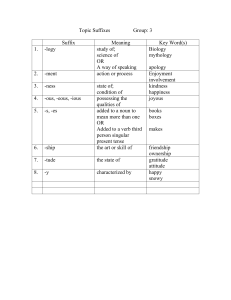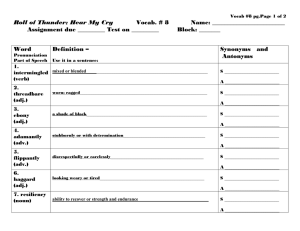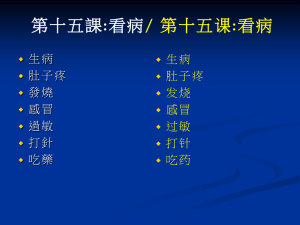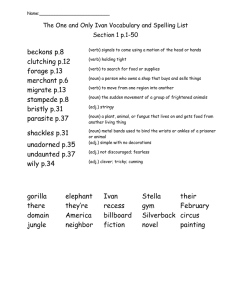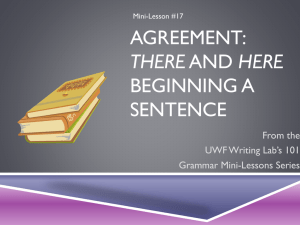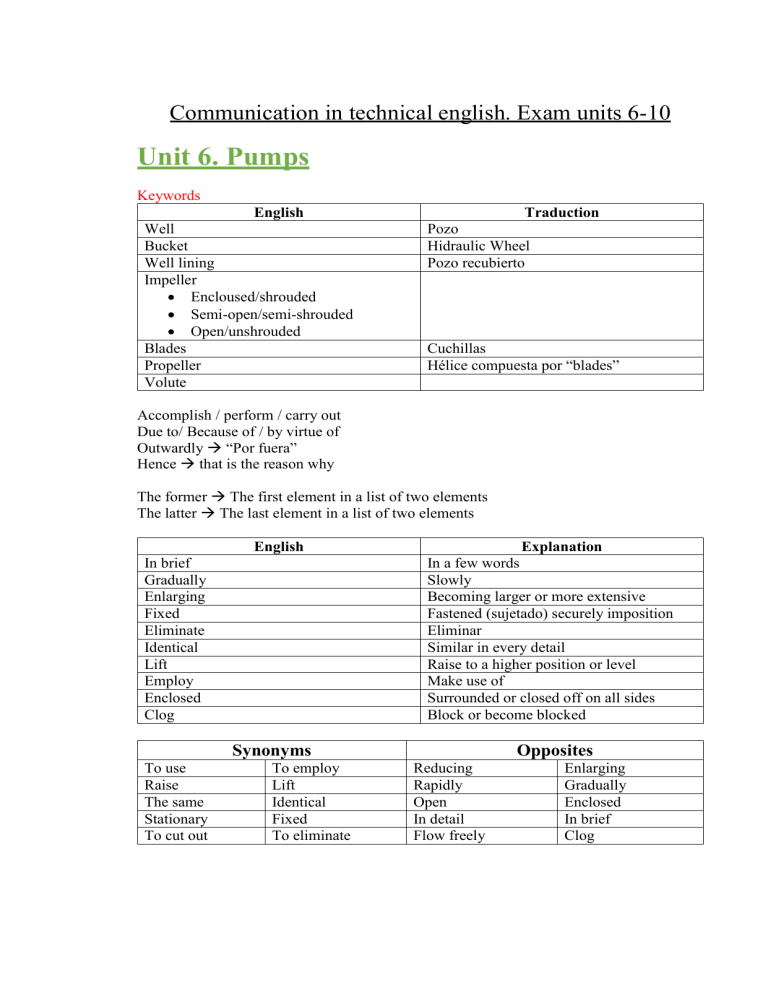
Communication in technical english. Exam units 6-10 Unit 6. Pumps Keywords English Well Bucket Well lining Impeller Encloused/shrouded Semi-open/semi-shrouded Open/unshrouded Blades Propeller Volute Traduction Pozo Hidraulic Wheel Pozo recubierto Cuchillas Hélice compuesta por “blades” Accomplish / perform / carry out Due to/ Because of / by virtue of Outwardly “Por fuera” Hence that is the reason why The former The first element in a list of two elements The latter The last element in a list of two elements English In brief Gradually Enlarging Fixed Eliminate Identical Lift Employ Enclosed Clog Explanation In a few words Slowly Becoming larger or more extensive Fastened (sujetado) securely imposition Eliminar Similar in every detail Raise to a higher position or level Make use of Surrounded or closed off on all sides Block or become blocked Synonyms To use Raise The same Stationary To cut out To employ Lift Identical Fixed To eliminate Opposites Reducing Rapidly Open In detail Flow freely Enlarging Gradually Enclosed In brief Clog GRAMMAR Remember also the use of time-linkers, as in these sentences: - During flow through the rotating impeller, the fluid receives energy from the vanes. At the same time the deflector is withdrawn from the jet. Then the needle can be moved to increase the flow in the pipe. After it leaves the discharge of one impeller, the water flows to the eye of the next. Unit 7. Air conditioning systems Keywords English To conveye Conveyor belt Coil Fan Traduction Transportar Cinta transportadora Bobina Ventilador Synonyms Neither large nor small Too high Very low Exact Not exactly/ roughly Opposites Medium-sized Excessive Extremely low Precise Approximately 2. Pipes convey hot water from the boiler to every part of the building. Goods are transported by truck from the port to their destination. In a closed refrigeration system, the fluid (e.g. water) circulates and recirculates. In some countries, the students can transfer from one university to another. In an air-conditioning system, the cool air flows from the supply-air line to the conditioned space. 3. Valves are used to regulate the flow-rate of the fluid. To alter the temperature of a heating or cooling system, we must re-set the thermostat. In an efficient air-conditioning system, the temperature indoors is maintained at a fixed level. Since natural sources of energy are in short supply, it is important to conserve energy as much as possible. 4. To hold To maintain Comfort: a good or pleasant environment for people In unison: together at the same time Assure: make certain of something guarantee that something happens Traditional: what has normally been done up to now Current: modern practice; what is done nowadays GRAMMAR 1. PROCESS DESCRIPTION Neutral: because Formal: since Formal: as + Subject + Verb + OD DIFFERENCES between because and because of: He turned on the air conditioning because it was a hot day. He turned on the air conditioning because of the heat 2. EXPRESSING PURPOSE In order to + INFINITIVE So that + CLAUSE A humidifier is used in order to increase humidity. A thermostat is used so that regulates the cooling or heating coil. Dampers are used in the outdoor-air control mechanism in order to regulate the mixture of recirculated air and outdoor air. The outdoor-air control plan is necessary so that the mixed-air temperature is maintained. The temperature of supply air may be set to a higher value so that energy is conserved. Central heating systems are desirable in cold climates in order to provide a warm environment. Food must be refrigerated in order to extend its life. Engines need lubricating oil in order to prevent damage from friction wear. Car bodies must have several coats of paint in order to avoid corrosion. Unit 8. Diesel engines Keywords English Bearing Bolts and nuts Fixture Hex bolt Hoist Stud Valve guides Warped Work bench Válvulas guía Deformado Banco de trabajo Synonyms Sufficient Excessive Inadequate Traduction Cojinete Tornillos y tuercas Accesorio fijador Tornillo de seis lados Aparato levantador Opposites Enough Too Not good enough REMEMBER Enough it goes before a noun but it goes after an adjective. Permit: to give permission Provide: to supply Prevent: to stop / to avoid Ensure: “garantizar” 2. Lubricants are used to prevent friction. The coolant system must permit the coolant to expand. An outlet is provided so that excess coolant can escape. Piston rings must fit correctly to ensure proper sealing and oil control. GRAMMAR 1. POSSIBILITY AND CONDITION Do you remember? What will happen if...? can might Look at these examples: If the bearings are not lubricated, they will become damaged. If the seals fail, coolant can leak into the oil. If the oil filter is not changed regularly, it might become blocked. If + Present simple, future /imperative Ex: If you visit Paris you will see the Eiffel tower. 2. INSTRUCTIONS What you must do: Imperative Be careful Carefully Make sure …Should… What you must not do: Negative imperative Never… …should not… Male sure… (negative sentence) Unit 9. Data communications Grammar Past simple: to express actions which happens in the past outside the present unit of time. Present perfect: when the action happens in the past and have impact in the present. ● Charles Babbage ______produced_________ (produce) the first general purpose digital computer. ● Babbage's computer, unfortunately, ______was never used_________ (never, use). ● Modifications to telephone circuits ______have made_________ (make) it possible to use the telephone system for transmitting electronic data. ● The low cost of producing silicon chips _____has brought__________ (bring) electronic technology into our everyday life. ● Since the 1950s, the size of computers ______has decreased_________ (decrease) considerably. ● The first telecommunications satellite _____was launched__________ (launch) in 1965. ● Since then, satellite communications _____have became__________ (become) essential to many fields of technology. ● A computer_____has not been developed yet____________ (not yet, develop) which can create a work of art. (a) Giant valve computers, such as the one which js shown in the picture, required a lot of maintenance. Can be omitted (b) A central processor contains many cells, which at any time can be in one of two states: positively charged or negatively charged. No (c) The punched card, which was devised by Hollerith in the 1880s, was a major step in the development of the computer. Which was can be omitted. (d) A disk is a storage device which allows the computer system to store and retrieve data. NO (e) An information-retrieval system, which is called Dendral, was developed for organic chemists at Stanford University. YES (f) A computer memory may have, for example, 1,000 locations at which characters of information may be stored. NO Unit 10. Electric power systems Keywords Plunger desatascador Plural Criteria Axes Data Crises Singular Criterion Axis Datum Crisis Appendices Indices Matrices Vortices Appendix Index Matrix Vortex Prepositions To consist of To respond to To be composed of To deal with To apply to To be caused by To be associated with To belong to Prefixes Un- not Mono- one Mis- badly Re- repetition De- the opposite Sufixes -ify transforms adj to a verb -less means without something -ly transforms an adj to an adv -ise from adj to a verb -ible from a verb to an adj -ive from a verb to an adj It is not difficult to make a piece of metal into a magnet. It is not difficult to magnetise a piece of metal. This design was produced without much care. This design was carelessly produced. He was able to tell me the identity of the part. He was able to identify the part. It is possible to bend or flex many plastic materials. Many plastic materials are flexible. He did not communicate his ideas very well. He was not very communicative

